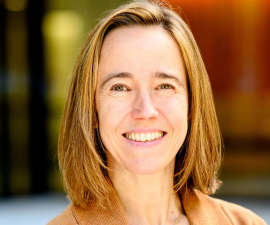

Research Bio
Maya L. Petersen, MD, PhD is Professor of Biostatistics and Epidemiology (UC Berkeley) and of Computational Precision Health (UCSF and UC Berkeley), the co-Director of the UCSF-UC Berkeley Joint Program in Computational Precision Health, and the co-Director of UC Berkeley’s Center for Targeted Machine Learning and Causal Inference. Dr. Petersen’s methodological research sits at the intersection of AI, statistical inference, and causal inference, with an emphasis on complex observational and experimental data, individualized treatment strategies, and study designs that adapt to incoming data. She uses these methods to learn better ways to deliver healthcare, both globally and domestically, and leads randomized trials and observational evaluations to deploy these insights and quantify their impact.
Dr. Petersen holds an AB from Stanford University in Human Biology, a PhD from UC Berkeley in Biostatistics, and an MD from UCSF. She has more than 200 peer-reviewed publications and has led multiple NIH and foundation grants, including the Sustainable East Africa Research in Community Health consortium. Dr. Petersen has received multiple awards, including a Howard Hughes Medical Institute Pre-doctoral award, a Doris Duke Clinical Scientist Development award, and a national teaching award from the American Statistical Association. In 2021, Mayor London Breed named June 18 “Maya Petersen Day” in San Francisco in acknowledgement of her services to the COVID-19 pandemic response.
Research Expertise and Interest
causal inference, precision health, Health AI, targeted learning, HIV, global health, pandemics
In the News
Innovative Joint Program in Computational Precision Health at UC Berkeley and UCSF Aims to Improve Quality and Equity of Health Care
Coronavirus: science and solutions
Featured in the Media
San Francisco was a few days into sheltering in place in March 2020 when Dr. Maya Petersen got a surprising and urgent request: Health officials wanted to know whether she could put together a model that would help them forecast what was shaping up to be a horrifying pandemic.


